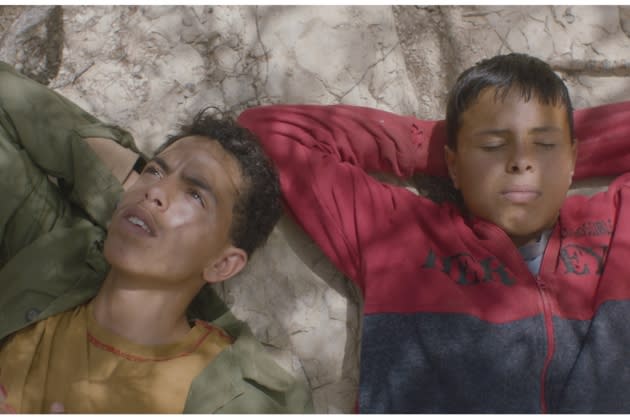Lotfi Achour’s ‘Red Path’ Wends Through the Cairo Film Connection
- Oops!Something went wrong.Please try again later.
- Oops!Something went wrong.Please try again later.
- Oops!Something went wrong.Please try again later.

The recent success of Cannes Directors’ Fortnight urban noir “Ashkal” from helmer Youssef Chebbi, and the 2021 international feature Oscar nomination for the provocative art world drama “The Man Who Sold His Skin” from director Kaouther Ben Hania reignited industry interest in projects from Tunisian directors. The Cairo Film Connection’s work-in-progress section supports this interest by offering the first Arab world look at “Red Path,” the second feature from Tunisian theater and cinema helmer Lotfi Achour (“Burning Hope”). The production is very different in style and genre from those of his aforementioned compatriots.
Inspired by real events and deeply rooted in a particular social context, “Red Path” is set in an extremely poor and isolated region of Tunisia’s northwest where, in 2015, terrorists attacked two young shepherds. They decapitated the older boy and commanded his younger cousin to bring the severed head back to the family as a gruesome message.
More from Variety
Ahmad Abdalla's '19B' Explores Clash of Cultures in Cairo as City Modernizes
Steven Spielberg's 'The Fabelmans' to Open Cairo Film Festival
Achour says, “Like all Tunisians, I was furious at my country for once again failing to protect its most vulnerable children, and not even coming to their aid when the worst happened. Nevertheless, I also felt complicit in the state of misery and abandonment in which this community found itself, and which left them at the mercy of bloodthirsty fanatics.”
Although Achour’s narrative is marked by a bloody starting point, he refuses to exploit the gruesome aspects. Rather, through the main youngster and his unique mourning process, the helmer explores the precise moment in life when the boy is brutally wrenched from innocence, and becomes aware of the violence of the world. It’s also the moment when the lad realizes that the adults he had previously thought were capable of protecting him are powerless.
Achour ups the veracity factor of his three adolescent characters by casting non-professionals from the region. To prepare them for the shooting, he used an extended pre-production period to work with them and other teenagers from the area.
The film marks a first collaboration between Achour and the expressive Polish cinematographer Wojciech Staron, known for international titles such as Paula Markovitch’s “The Prize,” Laila Pakalnina’s “Dawn” and Diego Lerman’s “Refugiado” and “Sort of Family,” among others. Producer Anissa Daoud says, “Staron’s filmography and sensibility matches Lotfi’s vision perfectly. His way of filming children (a discreet and immersive camera, as close as possible to the faces, textures and skins prematurely damaged by the trials of life), his way of filming landscapes that reveals their mystical charge, of providing substance to his image, of composing a universe that is carefully studied, singular, constructed and yet still realistic, matches Lotfi’s aesthetic project.”
Producer Daoud of Tunisia’s APA (Artistes Producteurs Associés) and her longtime collaborator Sébastien Hussenot of France’s La Luna Productions put together an international co-production package that includes Gwennaëlle Libert of Belgium’s Versus Production, and Edyta Janczak-Hiriart and Joanna Symanska of Poland’s Shipsboy. The film’s concept was developed in and supported by festival platforms including the Chabaka Program in Carthage, the Cinegouna Platform, the Beirut Cinema Platform and the Doha Film Institute. Daoud notes that the cultural eclecticism of these varied platforms allowed the filmmakers to find a safe space to make the project grow while preserving its identity and singularity.
Daoud says that she and Hussenot are actively working to have the film ready for early 2023. By participating in the Cairo Film Connection, they will be able to elicit the opinion of professionals from all over the world, which is important for their stage of post-production. It also offers them the opportunity to meet with international sales companies. And, she adds, “There is also the possibility to have financial support which is extremely valuable for this film which is a big production challenge. I keep my fingers crossed.”
Next up for Achour is a feature-length documentary, a sort of sequel to his short film “Blind Spot” (2016), which was presented in more than 40 festivals. In addition, he is developing two feature-length fiction titles. One is a period film, telling a story from the early 20th century that takes place on the Tunisian island of Djerba and in several European countries. The other is a light comedy that he hopes to shoot more quickly.
Best of Variety
Sign up for Variety’s Newsletter. For the latest news, follow us on Facebook, Twitter, and Instagram.
